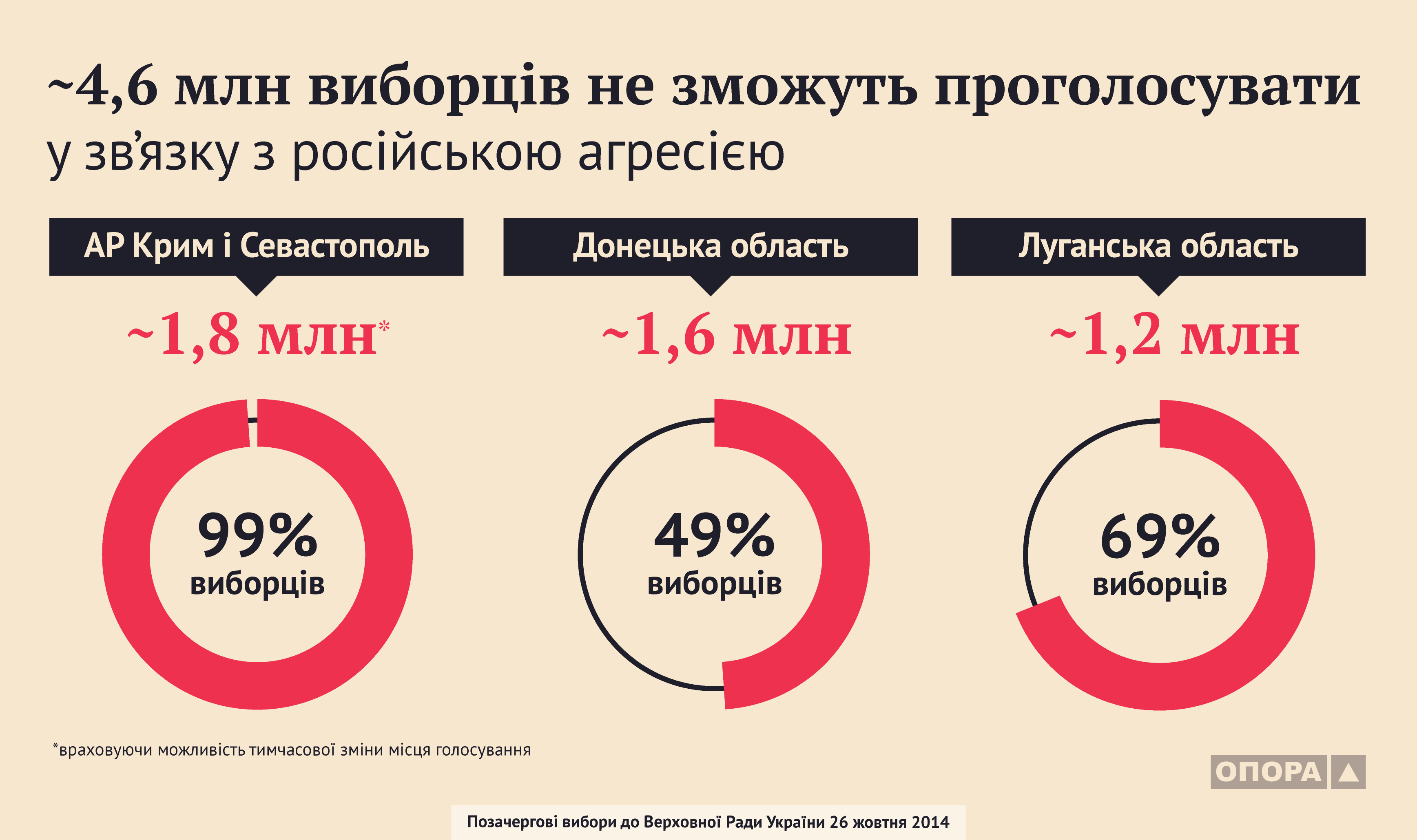In comparison with 2012 elections, the influence of administrative resource has decreased, election campaign is more competitive and the access to information is more open in 2014 parliamentary elections, according to OPORA. However, the safety of election participants and administrators, inevitability of punishment for violation of citizen voting rights, and influence of illegitimate campaigning methods are key challenges of this year election campaign. As of 23 October, observers of the OPORA reported 502 incidents of electoral violations committed by candidates and political parties that are electoral subjects. The most common violations are: violation of campaigning rules (212 incidents), voter bribery (117), misuse of administrative resource (84), and interference in the election process with the use of force (74). At the same time, observers of the Civil Network OPORA didn't report any violations on a massive scale in October that could significantly influence the election results. OPORA welcomes decision of the CEC to simplify the procedure of temporal changing of voting location for citizens of Donetsk and Luhansk oblasts; and the adoption of law on strengthening liability for violation of citizen voting rights, which should improve the course of election day and become a preventive measure for falsification attempts.
All top political parties have intensified their campaigning in October. Besides outdoor and media advertising, the street campaigning become more widespread. The Petro Poroshenko Bloc, the AUU Batkivshchyna, the People's Front and the Radical Party of Oleh Liashko conducted the most wide-scale campaigns. These parties used all available forms of campaigning and cover 70% of electoral districts with active campaigning efforts. The Civic Position, the Strong Ukraine, the Opposition Bloc, the AUU Svoboda, the Samopomich and the ZASTUP parties were less active. At the same time, activities of other active parties (the Right Sector, the Internet Party of Ukraine, the Block of the Left Forces, the Liberal Party of Ukraine, the Political Party 5.10) were mostly focused on the use of outdoor and media advertising.
Electoral and Parliamentary Programs Coordinator at Civil Network OPORA Olha Aivazovska stated: "As of 23 October, observers of the Civil Network OPORA reported 502 incidents of electoral violations committed by candidates and parties that are electoral subjects. The most common incidents were related to violation of campaigning rules (212). Voter bribery is on the second place – 117 incidents. Misuse of administrative resources was reported less often (84 incidents), as well as the interference in the election process with the use of force (74 incidents). At the same time, observers of the Civil Network OPORA didn't report any violations on a massive scale in October that could significantly influence the election results."
OPORA noticed 101 incidents of indirect voter bribery in 20 Ukrainian oblasts. Most of them occurred in Odesa, Kharkiv, Chernihiv, Cherkasy, Kirovohrad oblasts and the city of Kyiv. Such violations were committed by self-nominated candidates the most often (70%). As for party list candidates, voter bribery was most often used by the Petro Poroshenko Bloc, the People's Front, the Strong Ukraine, the Batkivshchyna, and Zastup party. Reported incidents of misused administrative resource can be divided into two groups: when state officials and executives participate in the election campaign (27 incidents in 14 Ukrainian oblasts) and when premises of government authorities are used in campaigning purposes (23 incidents in 11 Ukrainian oblasts). Officials and executives were often involved in illegal campaigning activities in Kharkiv, Volyn, Chernivtsi oblasts, and the city of Kyiv.
As for the main manifestation of criminal interference in the election process (with the use of force) is damaging the property and campaign materials. There are 55 such incidents reported from 15 oblasts of Ukraine. Most of them occurred in Kyiv city, Zakarpattia oblast, and Chernivtsi oblast. More serious crimes having consequences and influence on the election process are attacks against candidates, party activists and observers. There are 11 such incidents reported from 9 oblasts of Ukraine. According to new regulations of the Criminal Code, such actions are punished with limitation or deprivation of liberty for two to five years (Article 157(2) of the Criminal Code of Ukraine).
Rotations in district election commissions (DECs) continued in October. OPORA's analyst Oleksandr Kliuzhev stated: "membership of all DECs was substituted for 46% after their creation. According to OPORA's calculations, 121 heads of DECs, 126 deputy heads of DECs, and 127 secretaries were substituted from 9/5/2014 to 10/22/2014 (while the total number on every position - 213). However these rotations didn't cause any significant problems in administration of the election process, with the exception of Donetsk and Luhansk oblasts. At the same time, substitution of almost 50% of DEC members decreased efficiency of trainings conducted by the Central Election Commission (CEC) for commission members, as long as they terminated their powers prematurely." Taking into consideration appeals of Donetsk and Luhansk Oblast State Administrations, the Central Election Commission changed addresses of DECs #45, 51, 53, 59, 104, 114 without changing the boundaries and centers of single-mandate districts. Besides that, the CEC has changed location of DECs #45 and 59 twice (Donetsk obl.).
OPORA welcomes the decision of the CEC concerning voters from Donetsk and Luhansk oblasts, who are not required now to bring confirmation documents that are proving the need to change the voting location temporarily, when applying to the State Voter Register maintenance body. At the same time, OPORA would like to mention that the CEC was paying little attention to dissemination of information about election administration in districts of Donetsk and Luhansk oblast, fully or partly controlled by illegal armed groups, among electoral subjects and the wide public. Inactive position of the CEC in relation to these DECs was favorable for non-public activities of the latter and increased the risks of manipulation of election procedures.
In general, around 4,6 million voters won't be able to cast their votes due to military agression of Russian in Ukraine: around 1,8 million in the Autonomous Republic of Crimea and Sevastopol city, around 1,6 million in Donetsk oblast and around 1,2 million in Luhansk obalst.
